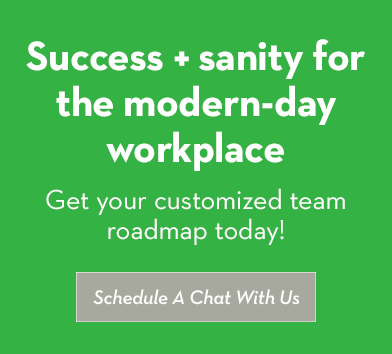When was the last time you wanted to stay in a job where you weren’t being challenged or using your talents? Where you knew exactly what to expect every day? Where there were no surprises and you knew you would have the same role in five or 10 years that you have today?
That might work for some people, but we’ll bet this doesn’t work for you.

Growth is a fundamental part of culture. Why? If you have a bunch of zombie-like employees who aren’t challenged and engaged, your business will not be sustainable. Culture is how work gets done. It’s not enough to say you have a growth-oriented culture, unless you really look at the opportunities for growth throughout every level of your organization.
We met Andy Fleming, a contributor to the book, An Everyone Culture: Becoming a Deliberately Developmental Organization, at the CulturatiSummit in Austin. He discussed what it means to have a deliberately developmental culture. It’s a culture that challenges and engages, individuals, collaborative teams, and leaders. To be successful now and in the future, your executives and employees need to develop and grow in order to help your company develop and grow.
At the conference, he posed four questions as key to understanding the developmental opportunities of your organization. We recommend doing this exercise with your team so you can hear the variety of answers people share.
When was the last time you grew at your job?
What were the factors at play?
Who helped you grow? And how?
What were you able to do afterward that you couldn’t do before?
Consider how were you able to be, see, think, and feel differently.
What did this time of growth mean for you in your work and life?
What are the conditions that create these types of experiences professionally?
So, what are you looking for with this exercise? If you get responses like the following, you are on the right track.
“No one was there to do it, so I jumped in and rolled up my sleeves.”
“We had little resources and a lot of passion, so the team was willing to make it happen, even though we didn’t know how.”
“My boss trusted me with a project I’d never done before.”
“I did a project with a team member who had a very different skillset than I did. We helped each other out with our own expertise and learned so much from each other along the way.”
The key to this exercise is to look at the varied responses you get and put them through this filter:
Is your organization creating these types of experiences for you and your people?
If the answer is no, how can you incorporate more of these opportunities into your daily work?
Andy Fleming and his teams have some big goals – to help 1 million businesses become Deliberate Developmental Organizations where everyone is developing every day. We’re inspired by his effort, and we hope you are too.
All smart, successful employees highly value engagement. They want to have challenges and play a part in helping the organization succeed. As a creative leader, it’s important to help your organization move towards a more deliberately developmental culture.
